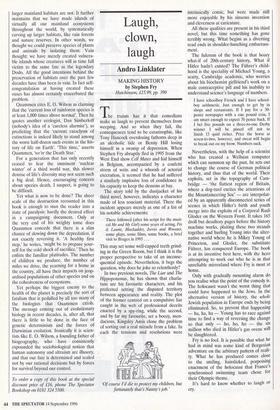Laugh, clown, laugh Andro Linklater
MAKING HISTORY by Stephen Fry Hutchinson, £15.99, pp. 390
The truism has it that comedians make us laugh to prevent themselves from weeping. And so when they fail, the consequences tend to be catastrophic, like Tony Hancock overdosing fathoms deep in an alcoholic tide or Benny Hill losing himself in a swamp of depression. When Stephen Fry abruptly fled in 1995 from the West End show Cell Mates and hid himself in Belgium, accompanied by a confetti storm of writs and a whoosh of actorial execration, it seemed that he had suffered a similarly implosive loss of confidence in his capacity to keep the demons at bay.
The story told by the dustjacket of his third novel, however, indicates a character made of less souciant material. There the incident appears merely as one of a list of his notable achievements: There followed (after his script for the musi- cal Me and My Girl) some years of acting, Fly & Laurie, Blackadder, Jeeves and Wooster, some plays, some films, some books, a brief visit to Bruges in 1995
This may set some well-capped teeth grind- ing in the Green Room, but I think it is the proper perspective to take of an inconse- quential episode. Nevertheless, it begs the question, why does he joke so relentlessly? In two previous novels, The Liar and The Hippopotamus, he has shown that charla- tans are his favourite characters, and his preferred setting the disputed territory between appearance and reality. The plot of the former centred on a compulsive liar caught in the web of professional deceits enacted by a spy-ring, while the second, and by far my favourite, set a boozy, men- dacious, Kingsley Amis clone the problem of sorting out a real miracle from a fake. In each the tensions and resolutions were
'Of course I'd die to protect my children, but fortunately that's Nanny's job.' intrinsically comic, but were made still more enjoyable by his sinuous invention and cleverness at caricature.
All these qualities are present in his third novel, but this time something has gone terribly wrong. What begins as a diverting read ends in shoulder-hunching embarrass- ment.
The fulcrum of the book is that hoary what-if of 20th-century history, What if Hitler hadn't existed? The Fiihrer's child- hood is the speciality of Michael Young, a scatty, Cambridge academic, who worries about his biochemist girlfriend's work on a male contraceptive pill and his inability to understand science's language of numbers.
I have schoolboy French and I have school- boy arithmetic. Just enough to get by in shops and restaurants. If I pay for a 30- pence newspaper with a one pound coin, I am smart enough to expect 70 pence back. If I bet five pounds on a three-to-one Derby winner I will be pissed off not to finish 15 quid richer. Price the horse at seven-to-two, however, and sweat will begin to break out on my brow. Numbers suck.
Nevertheless, with the help of a scientist who has created a Wellsian computer which can summon up the past, he sets out to change the course of German political history, and thus that of the world. Their exploits, set in the topography of Cam- bridge — 'the flattest region of Britain, where a dog-turd excites the attentions of the Mountaineering Soc' — are interpolat- ed by an apparently disconnected series of scenes in which Hitler's birth and youth merge into the exploits of a Corporal Rudi Gloder on the Western Front. It takes 165 droll but desultory pages before the history machine works, plaiting these two strands together and hurling Young into the alter- native world where he is Mikey Young of Princeton, and Gloder, the substitute Fuhrer, has conquered Europe. The book is at its inventive best here, with the hero attempting to work out who he is in that unreliable mirrorland where Fry is most at home.
Only with gradually mounting alarm do you realise what the point of the comedy is. The holocaust wasn't the worst thing that could have happened to the Jews. In the alternative version of history, the whole Jewish population in Europe ends by being eliminated. So, to prevent that happening — ha, ha, ha — Young has to race against time to find a way of reversing the change so that only — ho, ho, ho — the six million who died in Hitler's gas ovens will be slaughtered.
Fry is no fool. It is possible that what he had in mind was some kind of Borgesian adventure on the arbitrary pattern of reali- ty. What he has produced comes close to the smiling, hairslicked, porpoising enactment of the holocaust that France's synchronised swimming team chose for their Olympic theme. It's hard to know whether to laugh or cry.


































































 Previous page
Previous page